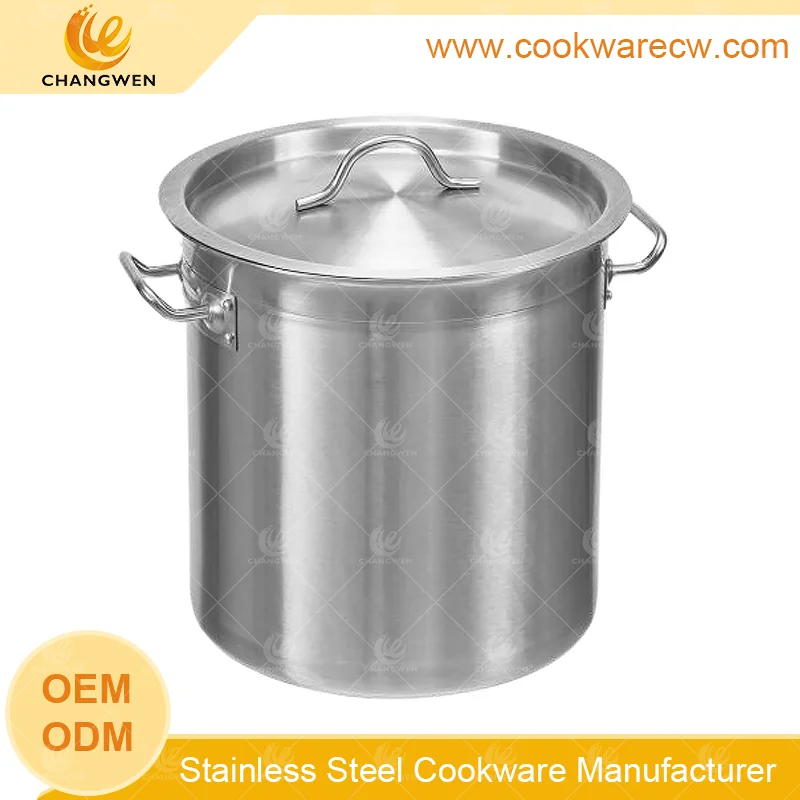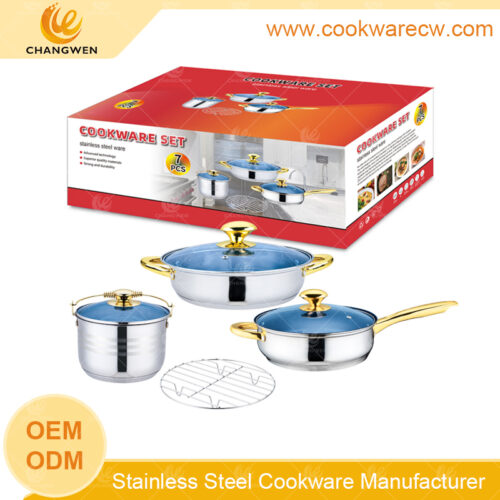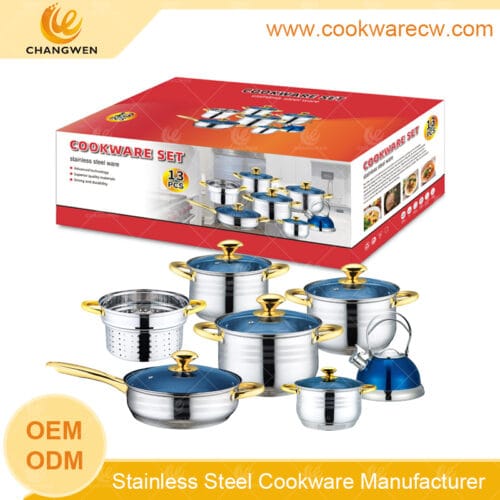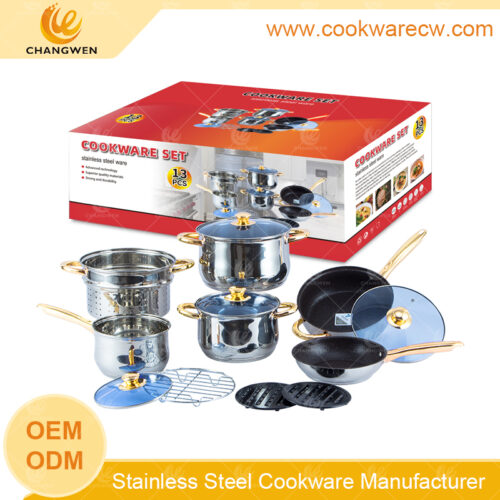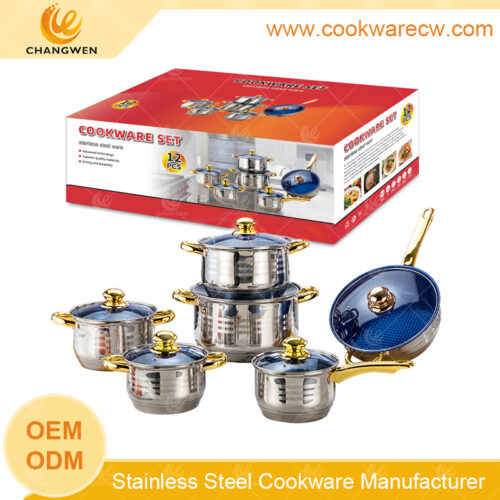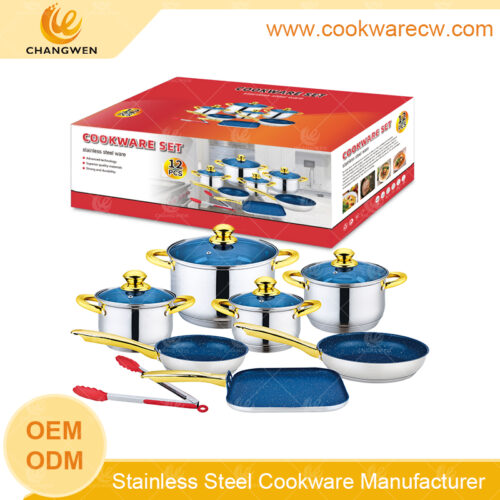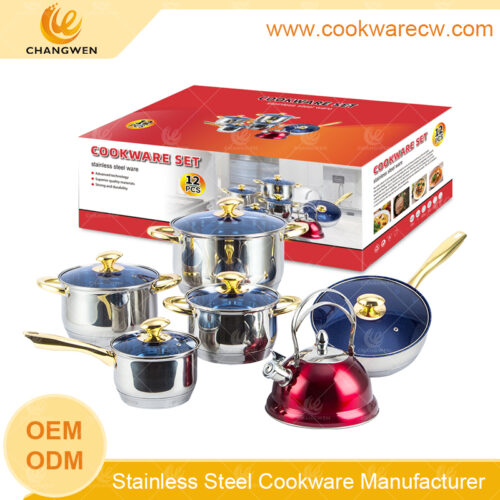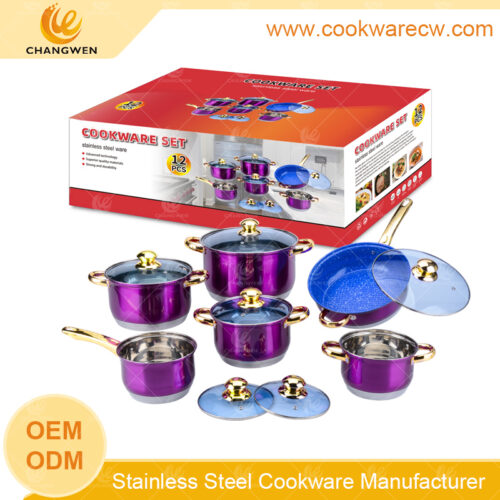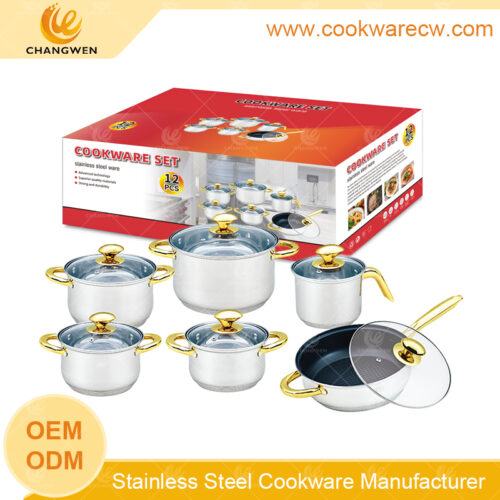Heavy Duty Stainless Steel Cooking Utensils
Changwen is the best heavy duty stainless steel cooking utensils manufacturer in China. With good performance production equipment, Changwen can provide you with awesome and best products.. Changwen provides wholesale customization services, a one-stop solution for all your heavy duty stainless steel cooking utensils needs. Send us your inquiry!
Tel: 86-13929001235 (WhatsApp)
E-mail: changwen@cwcooking.com
Heavy duty stainless steel cooking utensils refer to commercial kitchen utensils designed for high-intensity and high-frequency use scenarios, and must meet the following core standards:
Material strength: high-specification stainless steel (such as 316, 17-4 PH) is used, which is resistant to deformation and wear.
Durability: It can withstand high temperature, high pressure, frequent cleaning and acid and alkali corrosion.
Functionality: It is suitable for commercial kitchen needs (such as large capacity, uniform heat conduction, and easy operation).
Compliance: It meets international food safety standards (such as FDA, LFGB).
Our heavy duty stainless steel cooking utensils include frying pan, saucepan, soup pot, whistling kettle, etc.
一. Core features of heavy stainless steel kitchen utensils
1. Material and performance
| Stainless steel grades | Characteristics and uses |
|---|---|
| 316 stainless steel | Contains molybdenum (Mo 2-3%), resistant to strong acid and alkali corrosion (such as lemon juice, vinegar, sea water), suitable for coastal or high-salt environments. |
| 304 stainless steel | General-purpose food-grade stainless steel, strong corrosion resistance, high cost performance, suitable for conventional commercial kitchens. |
| 430 stainless steel | Economical ferritic stainless steel, containing 16-18% chromium, weak rust resistance, mostly used for accessories (such as pot lids and handles). |
| 17-4 PH stainless steel | Precipitation hardening stainless steel, twice as strong as 304, high temperature resistance (≤500℃), used for high-strength parts such as knives and grills. |
2. Structural design
Thickened base material: pot body thickness ≥1.5mm (ordinary pot is 0.8-1.2mm), and the ability to resist deformation is increased by 50%.
Composite multi-layer structure: outer stainless steel + middle aluminum/copper layer (heat conduction layer) + inner stainless steel layer to improve thermal efficiency.
Seamless welding: Laser welding technology eliminates gaps to prevent food residue and bacterial growth.
3. Functional design
Large capacity design: Commercial woks can reach 50-100L capacity, suitable for large stoves.
Non-slip handle: All-inclusive heat-insulated handle (temperature resistance ≥300℃), ergonomic grip.
Removable accessories: Steamer, filter, etc. support quick disassembly and assembly, easy to clean and store.
4. Durability test
Load-bearing test: The pot body withstands a static weight of ≥50kg without deformation (such as commercial woks).
Abrasion test: No scratches after 1000 times of steel wool friction (ASTM D4060 standard).
Corrosion test: Salt spray test ≥72 hours (ASTM B117 standard).
二. Detailed explanation of manufacturing process
1. Raw material selection and pretreatment
Plate standard:
Commercial cookware must use stainless steel plates (316/304) with a thickness of ≥1.2mm.
Provide a material certificate (SGS report) to clarify the content of nickel, chromium and molybdenum.
Cleaning process:
Electrolytic degreasing (pH 8-10, temperature 60-80℃) → pickling (nitric acid concentration 10-15%) → passivation (chromate treatment).
2. Core manufacturing process
Cutting and forming:
Laser cutting (accuracy ±0.1mm) → hydraulic forming (pressure ≥500 tons).
Complex shapes require multiple stampings (such as special-shaped soup pots).
Welding process:
Argon arc welding (thin-walled parts) → plasma welding (thick plate splicing).
The weld is polished to Ra≤0.2μm to avoid dirt.
Surface treatment:
Physical polishing: mechanical grinding (mirror effect, Ra≤0.1μm).
Passivation treatment: Soak in nitric acid solution to form a dense oxide film (Cr₂O₃ layer).
3. Quality control nodes
Weld inspection: X-ray flaw detection (in accordance with ASTM E94 standard).
Corrosion resistance test: Salt spray test ≥ 72 hours (ASTM B117 standard).
Load-bearing test: Load 50kg weight in a simulated commercial scenario and detect deformation (≤1mm).
4. Environmental protection and safety process
Chromium-free passivation: Oxalic acid or fluorozirconate is used to replace traditional chromate treatment.
Clean energy: Electric furnaces are used throughout the production process (to avoid coal-fired pollution).
Packaging materials: Degradable EPE pearl cotton + kraft paper, PVC plastic is prohibited.
三. What are commercial cooking utensils
Commercial cooking utensils refer to cooking equipment specially designed for use in commercial kitchen environments to meet the needs of large-scale catering services. These equipment are usually used in catering places such as hotels, restaurants, and restaurants. In terms of stainless steel cooking utensils, commercial products usually use thicker stainless steel materials to withstand greater pressure and wear. In addition, the design of commercial cooking utensils also pays more attention to practicality and convenience to meet the needs of efficient kitchen operation. For example, stainless steel pots, spatulas, spoons and other utensils commonly used in commercial kitchens usually adopt wide sizes and heavier designs to improve cooking efficiency and stir-frying effects.
Fourth, common problems and solutions
1. How to choose the right stainless steel grade?
Coastal areas: 316 stainless steel (salt spray corrosion resistance) is preferred.
High cost-effective demand: 304 stainless steel (strong versatility, cost controllable).
High frequency use: 17-4 PH stainless steel (high strength, long life).
Related products

Stainless steel kitchen 7pcs cookware rice cooker with capsule bottom frypan with helper gold plated hollow handle and blue glass wire rack CW-M0701

Mercado Libre stainless steel 13pcs cookware set tea kettle pasta pot nonstick frying pan golden handle blue coating CW-M1305

Factory Wholesaler 13 pcs nonstick stainless steel cookware set fry pan saucepan casserole steamer rack black mats CW-M1301

hot sales 12pcs stainless steel cookware set saucepan casserole non-stick frypan with golden handles & knobs & 5-stepped capsule bottom CW-M1202

Hot sale SS ollas non-stick coated frying pans and pots stock pot with a kitchenware clip CW-M1204

hot sales cookware supplier 12pcs cooking pots and pans stainless steel cookware set fry pan saucepan coating tea kettle CW-M1223

color coating surface stainless steel pots non-stick frypan golden S/S handles and knobs 430 protector for induction CW-M1225

high quality stainless steel pots and pans 12pcs cookware set nonstick fry pans with 5-9 steps capsule bottom CW-M1212

